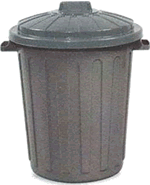
One of the things we discussed last night in the French conversation group was the origins of the word poubelle (bin / trash can). Fortunately one of us had an French etymological dictionary and we discovered that such receptacles are named after Eugène Poubelle (1831-1907), a lawyer, administrator and diplomat who was préfet of the Seine region of France and introduced the bin to Paris.
It was on 7th March 1884 that Poubelle decreed that owners of buildings must provide those who lived there with three covered containers for household rubbish, which was to be sorted into perishable items, paper and cloth, crockery and shells.
The containers proved popular with Parisians, who named them Boîtes Poubelle after Monsieur Poubelle, although building owners were not so keen as they had to pay for the containers and to have them emptied. Another group who didn’t welcome the Boîtes Poubelle were the chiffoniers (rag-and-bone men), who made their living from collecting rubbish.
As well as meaning bin, poubelle can also be used to refer to old cars in a poor state of repair – old bangers in the UK. Related words include:
- camion-poubelle – bin lorry
- jeter à la poubelle – to throw in the rubbish
- sac poubelle – bin liner
The name Poubelle comes from pou bel (peu beau – just beautiful), from the dialect of Pas-de-Calais in northern France.
In English there are many words for poubelle. In the UK, for example, the small ones used inside are known as waste baskets, waste paper baskets, rubbish bins or bins; and the larger ones used outside are known as dustbins, rubbish bins, wheelie bins (if they have wheels) or bins. The ones in public places are known as litter bins. Names for such receptacles in the USA include trash can and garbage can, and I’m sure there are others.
In the UK rubbish is collected by bin men (the majority of them are men) who drive (dust)bin lorries / rubbish trucks / dust carts, and is taken to (rubbish) tips / dumps / landfills / recycling centres / incinerators. There are also official terms for all these – refuse disposal operatives, and such like. What about in other countries?

